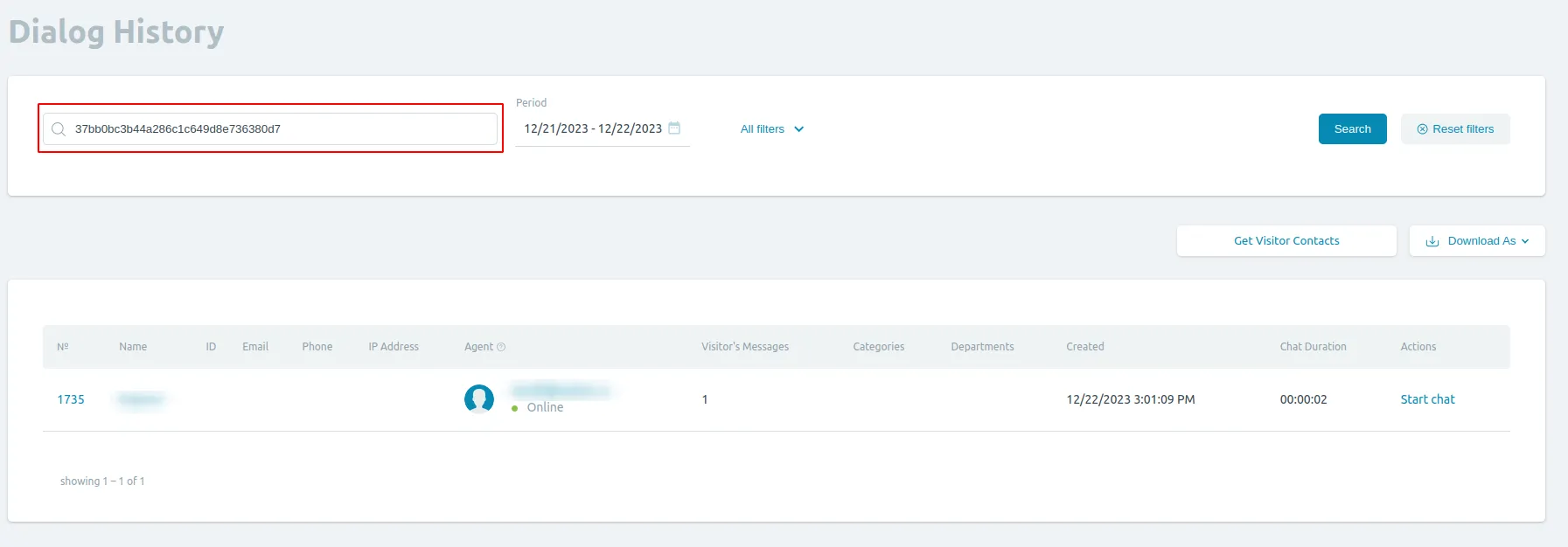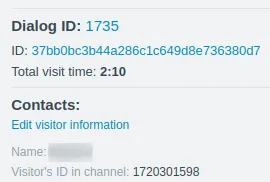Visitor Identifiers
In order to identify visitors in the system and link their requests, Rox.Chat provides the possibility for a visitor to have three different identifiers:
| Identifier | Type | Description | Mandatory |
|---|---|---|---|
visitor_id |
GUID | Internal unique identifier of a visitor in Rox.Chat, by which the visitor is identified in the system. It is assigned to a visitor when he/she submits a request for the first time. | Yes |
provided_visitor_id |
Depends on the particular system from which the identifier is passed. | A visitor identifier assigned in the client's system, reported by the client to the Rox.Chat service. For example, it can be a user ID in a CRM system or on a client's website. Used for chat routing and data exchange between Rox.Chat and the client's system with which it is integrated. | No |
channel_user_id |
Depends on the particular channel. | The identifier of the visitor in the communication channel. | No |
visitor_id
This pseudo-unique identifier is assigned to each visitor and is displayed in Workspace during the chat in the ID field:
If a user makes a second visit and his/her identifier was stored in browser cookies during the previous visit, he/she is identified by the system as a previously visited visitor with the same visitor_id history. Accordingly, if a visitor leaves requests through different browsers, then for Rox.Chat he is two different users with different visitor_id.
You can search for a visitor's closed chats by visitor_id using the search bar on the History page:

The internal ID is also passed to the bot when chat is assigned to it (see Assigning chat to a bot), and can also be passed to any custom API.
provided_visitor_id
This identifier is passed along with the visitor's data inside the visitor.fields object when the invocation comes from a third-party system or a client site where the visitor is authorized (see Identification of authorized clients. The type of provided_visitor_id may be arbitrary and depends on the client's system. The client must ensure that the provided_visitor_id is unique. Otherwise, if identical identifiers are passed for different visitors, for Rox.Chat such users will be considered as one person, as a consequence with a common chat history.
You can search for a visitor's closed chats by provided_visitor_id by specifying this identifier in the ID field on the History page:

Relationship between provided_visitor_id and visitor_id
When provided_visitor_id is first passed to Rox.Chat, an internal Rox.Chat identifier (visitor_id) is computed based on the visitor identifier passed by the client. In this way, Rox.Chat identifies each visitor with a non-zero provided_visitor_id by assigning its own visitor_id to the bundle, so that a visitor authorized on the client's site is considered the same user in Rox.Chat. In this case, every time the visitor will be authorized in the client's system and leave new requests, Rox.Chat will identify him by his old visitor_id and load old chats from the history.
In this case, if a visitor came to the site unauthorized, and then re-authorized in the client's system with the same provided_visitor_id, his visitor_id before authorization will be changed to the visitor_id, which was previously bound to provided_visitor_id. That is, for Rox.Chat before and after authorization he will be considered two different visitors.
N.B.
In case a visitor authorizes through a mobile application using Rox.Chat Mobile SDK, push notifications related to the support chat will be sent to all devices and all applications where they are authorized using their visitor_id and/or provided_visitor_id, i.e. in case there are several mobile applications on one device linked to the same Rox.Chat server, notifications about, for example, a new message will be sent to all these applications.
channel_user_id
This identifier is present in cases when the visitor applies through a communication channel and is displayed in Workspace during the chat in the Contacts block:
As with provided_visitor_id, each user with a new channel_user_id is assigned a visitor_id. In case a visitor requests support through different communication channels (respectively, has a different channel_user_id for each request), the system treats it as three different users with different chat history and different visitor_id.
The type of channel identifier is determined by the rules of each individual channel. The table shows the description of identifiers for the most common channels with which Rox.Chat integrates (in Rox.Chat they are considered as a string).
| Channel | Identifier format | Example |
|---|---|---|
| Telegram | An eight-digit numeric identifier. | 67854257 |
| Viber | A string consisting of upper and lower case Latin letters, numbers and symbols. | 5dfjdg5lfg8dGjg0DF95+h== |
| Visitor's phone number listed in full, no characters. | 10435685475 |
|
| The 15-digit numeric identifier contained in the user's profile link. | 103458712527651 |

